Key takeaways:
- Technology deeply influences daily life and societal interactions, posing challenges such as information overload and the digital divide.
- Social media reshapes political discourse, enabling grassroots movements but also facilitating the spread of misinformation.
- The balance between technology use and privacy is a continual struggle, raising questions about the cost of convenience versus the risk of oversharing personal information.
- Looking ahead, advances like artificial intelligence and blockchain could transform political engagement and voting processes, necessitating a careful approach to maintain authenticity and trust.
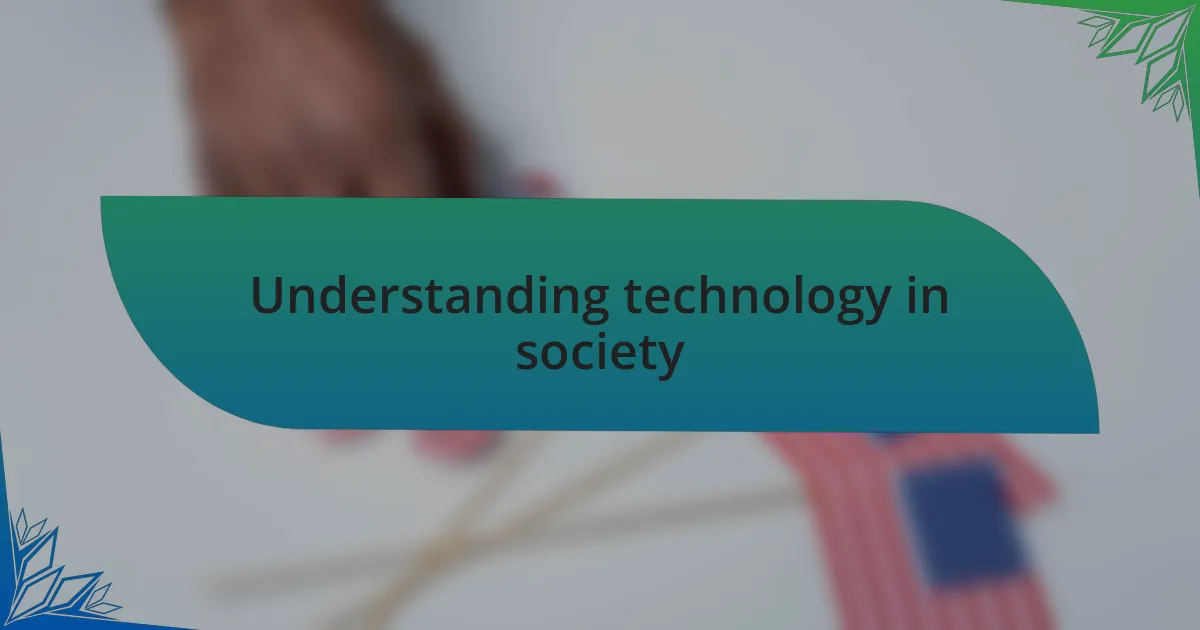
Understanding technology in society
Technology is woven into the very fabric of our daily lives, shaping how we connect, learn, and even think. I often find myself reflecting on the role of smartphones, which have become extensions of ourselves. Have you ever noticed how a simple notification can disrupt a meaningful conversation? It’s fascinating—and somewhat concerning—to see how quickly our attention shifts away from real-life interactions.
As we navigate this digital landscape, it’s essential to consider the societal implications of our reliance on technology. I remember attending a community forum where a local educator shared stories of students struggling with online learning—many were overwhelmed, and some felt isolated. This made me realize that while technology offers incredible resources, it can also deepen divides and create new barriers to access.
There’s also the intriguing paradox of information overload. With a wealth of knowledge just a click away, I sometimes wonder if we’ve become more informed or simply more confused. When I sift through social media and countless articles, I often find myself questioning the credibility of sources. How do we cultivate a critical eye in an age where misinformation abounds? It’s a challenge we all face, and it’s vital for our collective well-being.
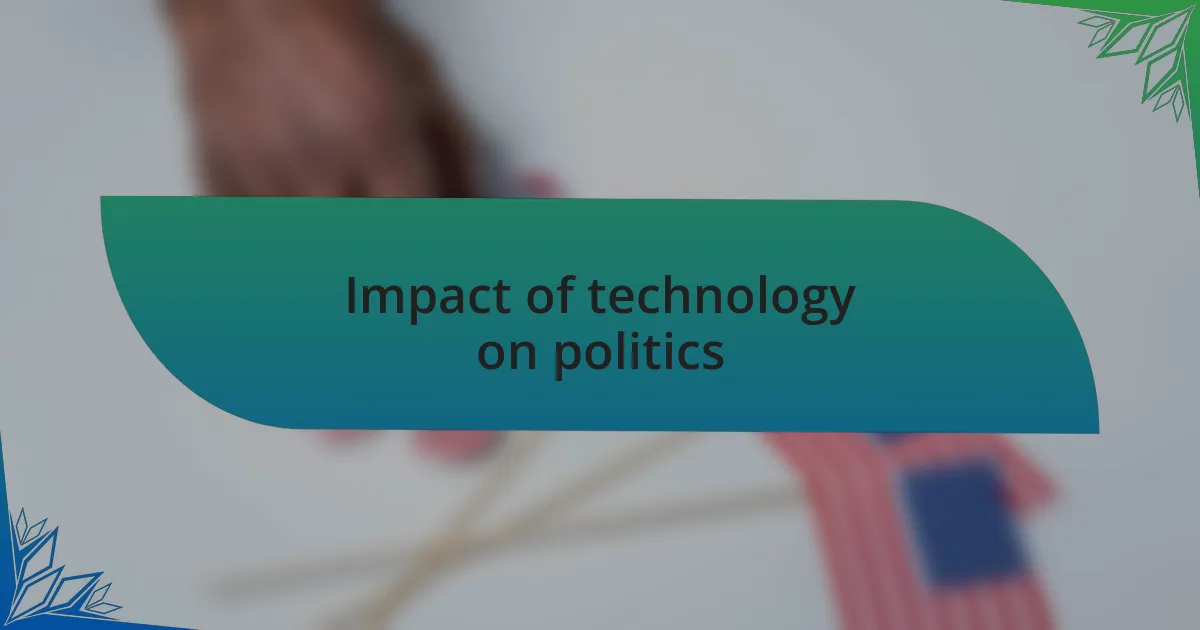
Impact of technology on politics
Technology has undoubtedly reshaped how political discourse unfolds. I recall attending a political rally where attendees were glued to their phones, tweeting and sharing updates in real time. Isn’t it interesting how a single tweet can have the power to mobilize thousands? The immediacy of digital platforms has given voices to many who were previously unheard, but it also raises concerns about the volatility of public opinion.
Social media, in particular, serves as a double-edged sword in politics. On one hand, it fosters grassroots movements, making it easier for diverse groups to organize and advocate for change. On the other hand, I’ve observed how easily misinformation spreads through these channels. How can one distinguish between genuine movements and those fueled by propaganda? This blurring of lines makes it imperative for us to develop critical media literacy.
Moreover, the use of data analytics in campaigns has changed the game significantly. I remember my surprise when learning how tailored advertisements target voters based on their online behavior. It feels both empowering and unsettling—how much does this intimate understanding of our preferences influence our political choices? While technology enhances engagement, it also introduces ethical dilemmas about privacy and manipulation that we must confront.
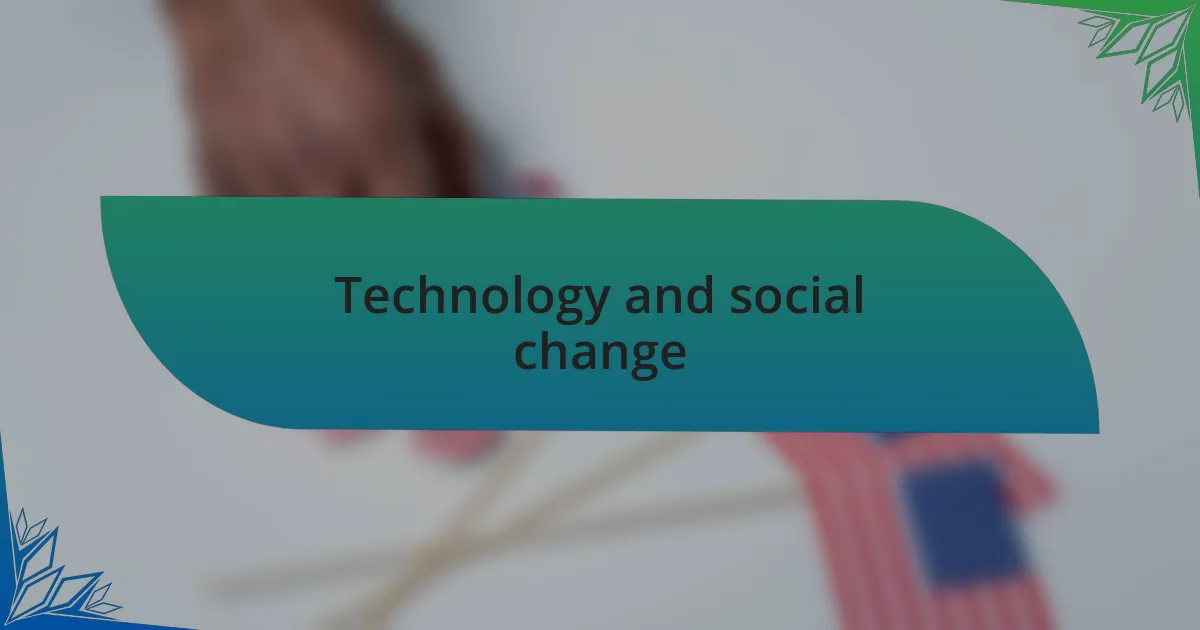
Technology and social change
The rapid advancement of technology has reshaped social dynamics in profound ways. I clearly remember the first time I saw a community rallying around an issue through a Facebook group. For many, online platforms have become a lifeline for connection and activism. Can you imagine how different the civil rights movement would be today if social media had existed then? The potential for mobilization is staggering, allowing marginalized voices to gather momentum in ways that were once impossible.
However, technology’s role in facilitating social change also invites a slew of challenges. I still feel that uneasy knot in my stomach when I think about the digital divide—how those without internet access are often excluded from these vibrant discussions. Isn’t it disheartening that while some can share their experiences on social media, others remain voiceless? This disparity highlights the need for equitable access to technology if we truly want social change to be inclusive.
Then there’s the issue of online echo chambers, which I find particularly troubling. I’ve seen friends dig deeper into their ideological bubbles, curating content that only reinforces their beliefs. How can we cultivate genuine dialogue when algorithms seem to prioritize division over understanding? This phenomenon makes it vital for us to engage with diverse perspectives, reminding ourselves that meaningful social change should be rooted in empathy and listening as much as it is in action.
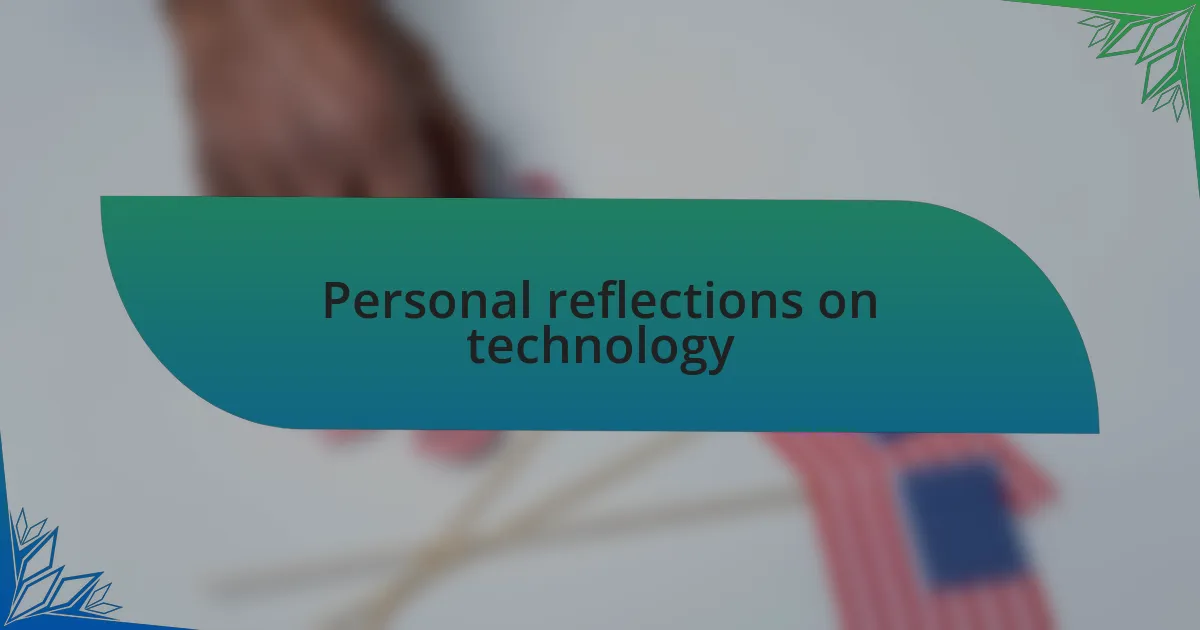
Personal reflections on technology
Technology has infiltrated every aspect of our lives, and honestly, it’s a mixed bag. I remember the first time I used a smartphone to organize a community event; the convenience was a game changer. But then, I wondered, at what cost? Are we becoming overly reliant on devices for human connection, losing the richness of face-to-face interactions?
Reflecting on my own journey with technology, I’ve noticed its ability to foster creativity. There was a time when I struggled to express my thoughts on political issues, but through blogging and social media, I’ve found my voice. Yet, amidst this empowerment, a nagging thought lingers: are we drowning in a sea of opinions rather than fostering understanding? The challenge lies in not just speaking out, but also in listening intently to those who may disagree.
While technology provides a platform for expression, the emotional toll of constant connectivity is something I grapple with. I often find myself overwhelmed by the barrage of information. How do we filter through the noise and find the messages that truly matter? In navigating this digital landscape, I strive to balance my engagement with an awareness of my mental health, recognizing that sometimes stepping back is the wisest choice.
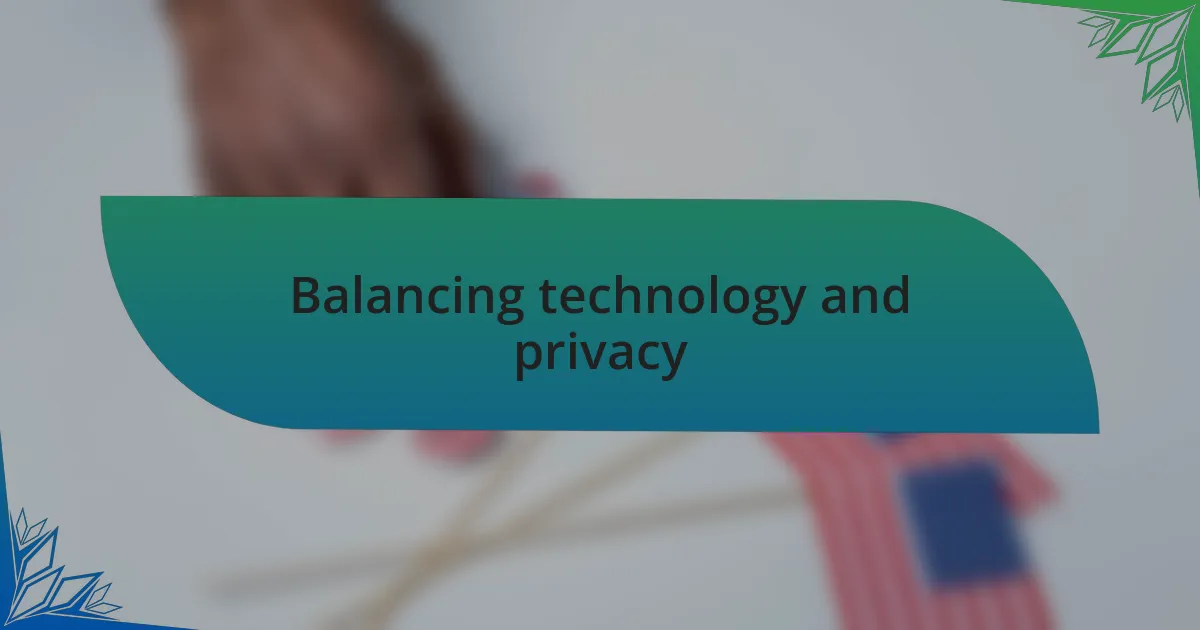
Balancing technology and privacy
Finding a balance between technology and privacy is an ongoing challenge I’ve faced firsthand. The moment I realized how much personal information I was sharing on social media made me pause. It hit me: is the convenience of staying connected worth the risk of oversharing? I find myself constantly toggling between enjoying the benefits of tech and being cautious about my digital footprint.
There was a time when I naively assumed privacy settings were enough to safeguard my information. But as I learned about data breaches and surveillance, I felt a growing unease. How can we authentically connect while still protecting our privacy in this hyper-connected world? I often remind myself to scrutinize the permissions I grant apps, yet I wonder—am I being too cautious, or am I simply being smart with my data?
Interestingly, I’ve also discovered that conversations about privacy can be surprisingly engaging. I often share my concerns with friends over coffee, and it’s fascinating how many have similar experiences. Does knowing we’re all navigating this tech-privacy tightrope provide a sense of solidarity? It’s comforting to know I’m not alone in this journey, facing the delicate balance between enjoying innovation and safeguarding what’s personal.
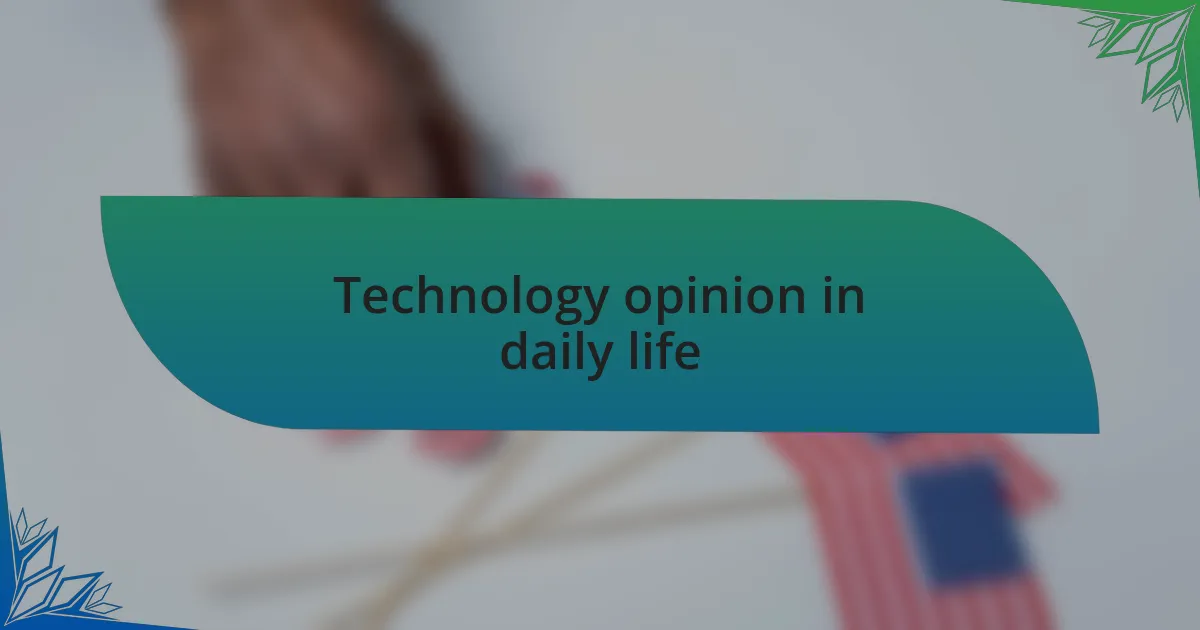
Technology opinion in daily life
Technology is woven into the fabric of my daily life, shaping not just how I communicate but also how I perceive the world around me. I’ll admit there are moments when I feel overwhelmed by the sheer volume of information at my fingertips. How many times have I scrolled through my news feed only to question the credibility of what I’m reading? This constant exposure can blur the line between informative and disorienting, leaving me to ponder: does technology enhance my understanding or just add to the noise?
As I navigate my day, devices serve as both tools and distractions. For instance, I find myself relying heavily on my smartphone for navigation and reminders. Yet, I can’t shake the feeling that my dependence sometimes inhibits my ability to engage with my surroundings. Have you ever noticed how we often walk around with our heads down, glued to screens, missing out on spontaneous interactions with others? It’s a humbling reminder that while technology offers incredible convenience, it can also disconnect us from genuine human experiences.
Reflecting on my personal journey, I’ve come to appreciate the moments when I unplug and step away from screens. Recently, I took a weekend camping trip where I left my devices behind. The tranquility of nature and the company of friends reminded me of the simple joys of being present. It’s heartening to realize that embracing technology doesn’t mean losing touch with the world; it’s about finding the right balance that honors both innovation and the richness of life beyond the screen.
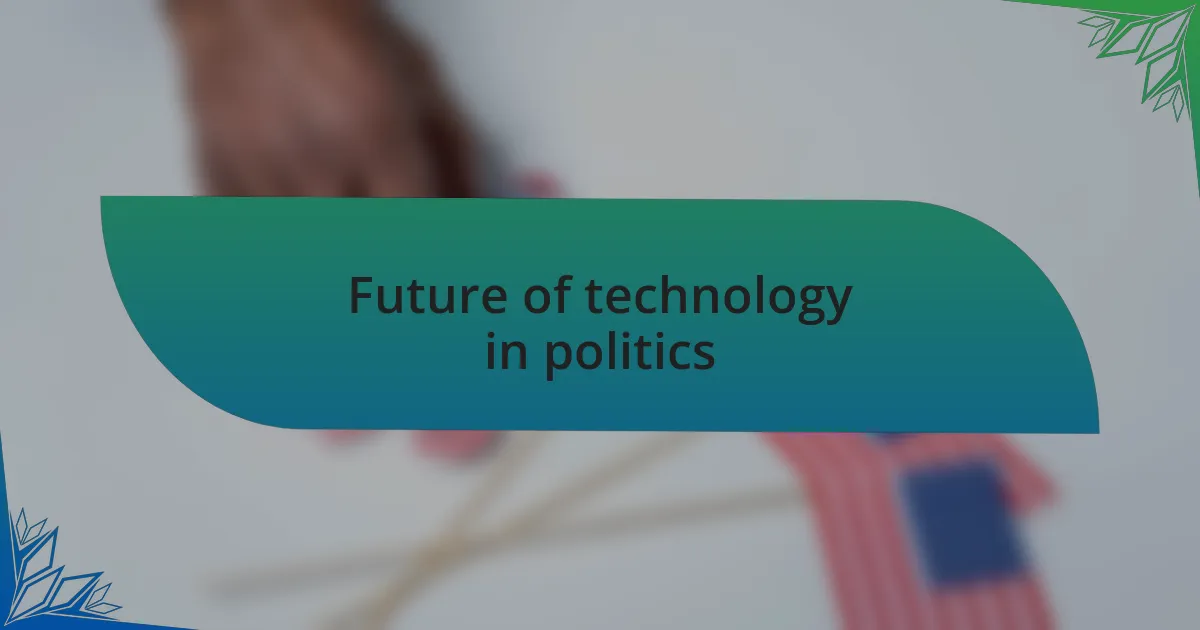
Future of technology in politics
As I reflect on the future of technology in politics, I’m both fascinated and cautious. The rise of artificial intelligence has the potential to revolutionize political strategies, enabling parties to target voters more precisely than ever. I often wonder, though: will this lead to greater engagement or simply reinforce existing divides by creating echo chambers?
Imagine a world where blockchain technology ensures transparent voting processes, eradicating concerns about fraud. I dream of a time when every vote is secure and verifiable, fostering trust in democratic systems. But I can’t help but think about the skeptics—what challenges will we face in convincing the public to embrace such innovations?
Looking ahead, I believe the integration of social media in political campaigns will only deepen. I’ve watched firsthand how candidates connect with younger voters through platforms like TikTok. Yet, the question lingers: as we adopt these tools, are we risking authenticity for the sake of reach? Balancing innovation with genuine connection will be critical as we navigate the complex interplay of technology and politics.